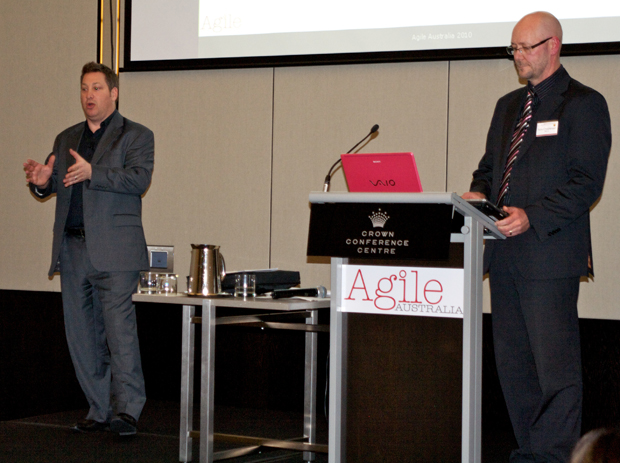Agile no slam-dunk for NBN Co

They may have helped Telstra deliver an 18-month project on a five-month deadline, but Agile project methodologies have proved to be anything but a sure bet for NBN Co, as ex-Telstra developers weigh in on what has proved to be far from a philosophical consensus at the greenfields telco.

Michael Bromley (left) and Tony Christensen (right) (Credit: David Braue/ZDNet Australia)
Agile methodologies replace conventional milestone-based, inefficient "waterfall" processes with a series of shorter "sprints" after which business requirements are again reviewed and several key features prioritised for the next sprint.
The approach is paying dividends to those who have adopted them: NBN Co was joined by Suncorp, Allianz, Jemena, Bankwest and others which were eager to trumpet their successes in slashing delivery times and producing final products that are more closely aligned with business requirements than ever.
Yet while greenfields companies are known for their ability to implement best practices unencumbered by legacy systems and processes, promoting Agile within NBN Co has still seen opposition as developers from different schools of thought come together to nut out a consensus for moving forward.
"It's an interesting group," Michael Bromley, head of portals and online services with NBN Co, told an audience at Slattery IT's recent Agile Australia 2010 conference in Melbourne.
"Just because we have a clean slate, and we're joining an organisation that is new and fresh, doesn't mean everybody believes that Agile is the way to go. You've got a lot of old-school ex-telco people, construction people, network people, and folks like me that don't come from a technical background, all trying to co-exist with nothing to fall back on. But we still get people saying Agile is 'just a big science experiment'."
Turning around Telstra
Bromley has heard it all before: when he joined Telstra just before the 2006 launch of the Next G network, he says, "nobody was thinking about Agile, or about anything but waterfall development. IT was a very tried-and-true environment, and a very embedded culture."
That all hit the wall last year, however, when business leaders told Bromley, who was still working as head of online at Telstra, they needed help getting a major Telstra Business loyalty and transaction processing system up and running. Project leaders had been trying for 12 months to get some traction on the effort and with just months to go, and estimates suggesting the portal would take 18 months to develop using traditional methods, Bromley was under the pump.
Development managers had suggested it would be ready to begin coding in 2010 — which would have delayed the system's completion well into 2011. After going through two development managers who had failed to deliver, Bromley met Tony Christensen, an Agile-minded contractor who joined the team as group manager for solutions development with Telstra Business.
Christensen said he would deliver the project by the deadline, but on two conditions: that he could choose the method to deliver the project, and that he could break it into two separate "tranches" of work — one with the bare-minimum functionality needed to get the system up and running by the deadline, and the other to incorporate additional functionality that could then be added in future iterations once the base system was operational and generating revenues.
"In the end, the proof was going to be in the pudding," Christensen joked. "It was either going to be the shortest engagement of my life, or the beginning of a long relationship."
It turned out to be both: the project, run on an Agile-waterfall hybrid strategy that became known as "AgiFall internally", went live on the 15 February deadline "and contributed significant million-dollar fresh streams of revenue into the organisation," Bromley explained.
"There were months that it was done in a very measured fashion, and a Herculean effort in the last two weeks. But Tony delivered the impossible in five months, and it really started to focus the organisation that it can be done; and [Agile] has now become a mainstream activity within Telstra."
Taking on NBN Co
Rather than bask in the successful introduction of change within Telstra, Bromley soon found himself recruited to join the NBN Co cause — and Christensen, now solutions development manager for portals and online services at NBN Co, followed soon afterwards.
Yet even though they had their successes at Telstra to their credit, Bromley and Christensen have found the process of sowing NBN Co's greenfields to be an exciting albeit intimidating experience.
"There is a real difference between trying to turn around a big behemoth like Telstra and change it from within, and walking into something new like NBN Co where there is no vision, no strategy, no methodology, nothing," Bromley explained. "It's the most exciting and scary thing you could ever imagine."
Bromley and Christensen remain steadfast Agile evangelists, but there is still a lot of work to be done to make sure NBN Co doesn't get stuck in the rut of monolithic development from which so many companies are still working to free themselves.
"It's a good exercise in organisation," said Bromley. "We try to be incredibly collaborative and incredibly flexible, but there is no one way to deliver anything and we're still overcoming the perception that Agile has less rigour because it has less documentation. But word of mouth spreads when the business doesn't have to wait six to 12 months to see a project come to fruition. It's all still evolving and going on in NBN Co."